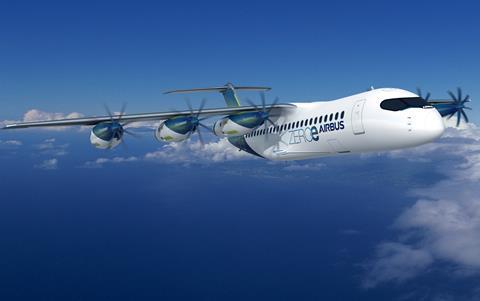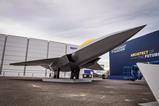GKN Aerospace continues to advance development of its 1MW hydrogen-electric powertrain under its H2GEAR programme but progress has been slower than hoped due to issues with the supply chain for its cryogenic electric motor.
Although the overall project is “progressing really well”, says Russ Dunn, chief technology officer of UK-headquartered GKN, it had hoped to complete testing of the powertrain in 2025, a milestone which has now slipped into 2026.

GKN has is developing a liquid-hydrogen-based system and intends to use the cryogenic fuel to bring gaseous helium to the same temperature, then using that gas to cool the entire system, boosting motor and electrical distribution efficiency.
Bench testing of a cryogenic demonstrator motor and distribution network to raise both systems to technology readiness level (TRL) 4 were due to have taken place last year, but GKN has struggled to secure suitable suppliers, delaying the project slightly, says Dunn.
“We found some quite significant challenges in the supply chain for the demonstrator motor; we’ve ended up having to bring a lot of that [component production] in house.”
Parts suppliers were either unwilling “to invest or allocate resources on a long-term hydrogen-type programme” or could not deliver the required quality, he says.
However, the need to internalise production has meant GKN “leveraged some unique IP” from across the business: “We have actually probably got greater value out of having to bring it in house than we anticipated, but it wasn’t in the original plan.”
The demonstrator motor – with power output of “hundreds of kilowatts” – is now being assembled at GKN’s Global Technology Centre in Bristol in southwest England and is “looking very, very good”, says Dunn.
Evaluations to show the motor and electrical network – the “really, really complex parts of the programme” – have reached TRL4 will take place “over the next couple of months” at the University of Bath’s IAAPS propulsion research facility in Bristol.
Assembly of the complete 1MW powertrain being developed through H2GEAR should be finished by the end of 2025, leading to the completion of testing by around mid-2026.
In addition to the 1MW system, Dunn says GKN has designed a conceptual system with double the output. Any decision to invest in building that powertrain “is something that we would need to go through based on value”.

As part of its studies, the company has created “design concepts” of 19-, 46- and 96-seat aircraft that could be powered by a hydrogen fuel cell powertrain, to better understand the real-world trade-offs and limitations imposed on its system. Dunn says it continues to see no obstacles to scaling the system further for a larger aircraft.
GKN’s studies suggest around 2MW combined output would be required for a 46-seat aircraft, and 8MW for a 96-seater.
Airbus is considering a fuel cell-powered 100-seat aircraft design under its ZEROe effort, to enter service in the middle of next decade, and has been developing its own 1.2MW powertrain.
Dunn says that while it has regular conversations with the airframer regarding hydrogen propulsion, there is, as yet, no formal agreement between the two.
“It would be completely strategically well aligned for us to do something with Airbus and we are very, very keen to further strengthen that relationship,” he adds.
Although he declines to provide details, Dunn says GKN is “increasingly confident” in its solution for the thermal management of the fuel cells. However, he stresses this can be improved if the fuel cell efficiency also increases.
H2GEAR is a project part funded by the UK’s Aerospace Technology Institute (ATI). GKN in late March announced the launch of separate ATI-backed project – HyFIVE – through which it will work with Marshall Aerospace, Parker Meggitt and three British universities to develop liquid hydrogen fuel system technologies.
GKN will develop the hydrogen storage tank and other components for the full system.































